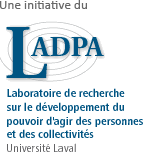Claire Jouffra, IRTS de Montpellier
Résumé Les professionnels de l’intervention sociale ont souvent l’impression d’être dans des impasses : face à des usagers de plus en plus nombreux et exigeants, ils en sont souvent réduits à fournir des réponses standardisées et individualisées. D’autres voix se font entendre qui donnent des pistes pour un renouvellement des pratiques. C’est ce que propose l’approche du développement du pouvoir d’agir (DPA) dont nous préciserons les caractéristiques. Elle permet de renouveler la définition de l’aide professionnelle. La mise en œuvre de cette approche nécessite un changement des repères professionnels habituels, d’où la nécessité d’une formation. Le postulat des formations actuellement engagées est qu’on ne peut se former au DPA que par le DPA, en le pratiquant d’abord pour soi. Une première évaluation de ces formations montre que l’approche DPA produit des changements de posture propices aux changements émergents.
Mots-clés aide professionnelle, apprentissage expérientiel, formation, changement émergent. Abstract Social Workers often feel stumped when being confronted by the demanding needs of an ever-increasing clientele; more often than not, they see themselves having to give standardized answers which are not always suited to the particular needs of the client. Among the community, voices are rising to offer new solutions in order to rejuvenate the methods and practices of Social Workers. This is what the DPA is all about, it will allow us to redefine what the Helping Profession is and we will describe its traits. The implementation of this approach requires Social Workers to alter their mind-sets, thus a specialized training is necessary. At this point in time, the teachings of the DPA stipulates that if a professional wants to learn how to work under this approach he or she must first experience it for himself/herself. A first look at these teachings demonstrate that the DPA could bring about some suitable changes to the stance of Social Workers who are expected to work with a diverse and evolving clientele.
Keywords emerging change, learning trough experience, professionnal help, training. |


 | 
|
| © 2025. Faculté des sciences de l'éducation, Université Laval, tous droits réservés. Site réalisé par le Centre de services et de ressources en technopédagogie. ISSN – 1918-3399 |




 Page précédente
Page précédente



 PDF]
PDF] Haut
Haut